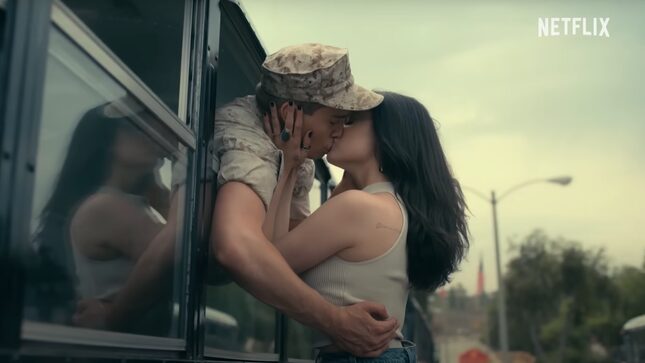Sofia Carson Defends ‘Purple Hearts,’ Netflix’s Military Propaganda Rom-Com, Amid Backlash
“We’re good enough to fight for your ass, but not enough to touch it?” one of the movie's bad boy U.S. marines at one point asks.
EntertainmentMovies

At the end of last month, Netflix dropped Purple Hearts, a movie that sounds a lot more like a horror movie than the rom-com it’s marketing as. The premise is simple and terrifying: Cassie, an aspiring singer-songwriter and current bar server struggling with diabetes, can’t afford insulin, and Luke, who struggled with substance before becoming a Marine, also has money problems. The two have vastly different political views and initially loathe each other, but nonetheless collude to enter a sham marriage that could address both of their problems, allowing Cassie to enroll in the military health insurance plan and Luke to reap the financial benefits of marriage. As you might’ve guessed, in true enemies-to-lovers fashion, they eventually, ~accidentally~ fall in love, nonetheless.
The name Purple Hearts itself is a clever little pun referencing the blending of their “blue” and “red” politics—Cassie is a liberal feminist and Luke is, well, someone who is shipping off to help kill Iraqi people. At one point he asks Cassie, “What exactly would you like us to do—go over there and teach them pronouns?”
Purple Hearts has been a phenomenally popular movie, likely owing to its undeniably attractive couple. At varying points, it’s topped Netflix’s most watched movie list, and has remained in the streamer’s top 10 for weeks after it was released on July 29. But it’s also drawn some predictable backlash, to which actor Sofia Carson, who portrays Cassie, finally responded over the weekend. What, really, did Netflix predict the reaction would be to a movie that pretty blatantly romanticizes U.S. military occupation in Iraq and somehow even the United States’ violent privatized healthcare system?
Much of this backlash has focused on a particular line in the movie in which one of Luke’s fellow Marines makes a toast to “hunting down some Goddamn Arabs.” The line itself seems like a pretty accurate representation of the U.S. military—I’d argue the real problem is the extent that the movie implicitly and explicitly justifies military presence in Iraq as somehow protecting the U.S., rather than just colonizer behavior 101 that’s swallowing up $1 trillion in federal funding, while kids rack up school lunch debt.
-

-

-

-

-

-

-

-

-

-

-

-

-

-

-

-

-

-

-

-

-

-

-

-

-

-

-

-

-

-

-

-

-

-

-

-

-

-

-

-








































